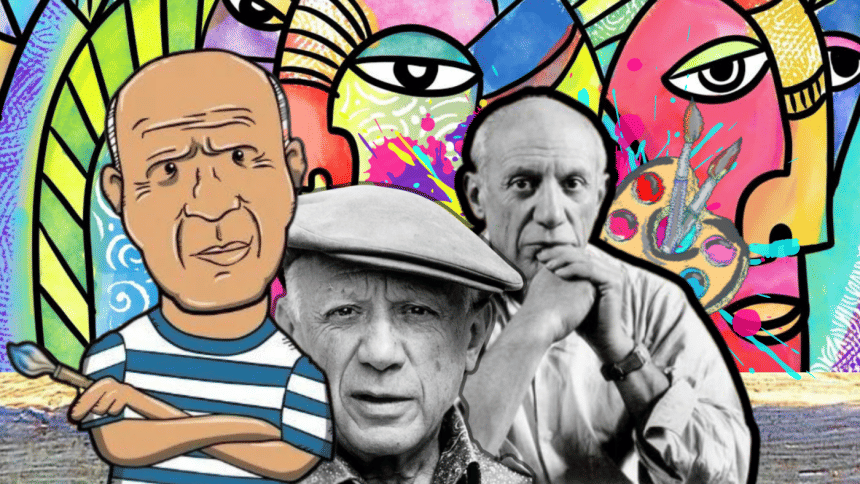7 life lessons we can take from Pablo Picasso’s artistic legacy

"It is not what the artist does that counts. But what he is." – Pablo Ruiz Picasso (1881–1973)
Spanish painter, sculptor, printmaker, ceramicist, and stage designer Pablo Picasso is one of the most prolific and timeless artists in the 20th century. He showed remarkable artistic aptitude at a young age and as he grew older, his artistic style evolved. His desire to explore led him to pioneering Cubism, alongside Georges Braque. He also invented the art of collages and made significant contributions to Symbolism and Surrealism. Years after his death, his art is still popular and recreated in many forms; clothes, accessories, decorations, replications etc. Most importantly, his artwork is a source of inspiration for many creatives and a point of references for artists. Picasso's inspirational reach isn't limited to creatives but the lesson we can take from his life is for everyone.
Here are 7 lessons from Picasso that you can incorporate in your life.
Open to changes
As an artist, Picasso was always evolving. Be that opening himself up to new influences or art styles, this change made him a versatile artist. His way of expression and creative exploration was constantly adapting and it's difficult to label him as a specific kind of artist as he is associated with almost every movement including cubism, surrealism and neoclassicism. He believed being open to new concepts and experiences was essential for self and creative advancement.
For us, being open to changes and new experiences can start with something as small as getting our morning coffee from a different cafe or taking an alternate route home. If we experience changes at home, in the office or anywhere else, instead of getting defensive and being reluctant to accept it, we can gain more by embracing the opportunity and seeking out how we can benefit from it.
Staying true to yourself
In this modern day and age of social media, trends and hustle culture, it's very easy to forget about what makes you, you. We tend to forgo our own individuality and unique traits to acclimate into what is trendy or socially accepted. However, Picasso stayed loyal to his own vision and style. In spite of his success which remains timeless today, his passions, artistic visions and beliefs were his own, and didn't cater to a trend or norm. His refusal to let outside expectations or pressures affect his work is inspirational for us and teaches us to remain resilient in retaining our own beliefs, goals and dreams.
Surrounding yourself with inspiring people
This lesson might sound a little elitist since not everyone is lucky like Picasso to have a close-knit group of intellectual and artistic friends. In this day and age, surrounding ourselves with individuals who inspire us might be difficult but being around people who motivate and encourage us, is a great way to get ideas and solutions. It might also feel intimidating being around such people, and we might feel inclined to put them down or even feel a little jealous towards them. However, in the world of networking and self-progress, such sentiments have no place. Picasso believed that surrounding oneself with inspirational individuals was essential to both personal and professional progress, and he valued the sharing of ideas and the support of others. Someone else's success doesn't entail your failure.
Embracing failure
We often stop ourselves from doing something because we fear failure. It prevents us from taking risks and experimenting, be that a career choice, picking up a new hobby, or following our passion. Unless something assures success, many of us don't even take the first step. But failure is evidently a part of success and unless you fail multiple times, you won't know how to improve and eventually succeed. This is something Picasso wholeheartedly believed. He was not afraid to take chances and make mistakes since he recognised that failure was an inevitable part of the creative process. He saw failure as an opportunity to grow and become better.
Discover your passion, then go after it
Picasso found out at a young age that he could draw, but more significantly, that he enjoyed it. He was artistic and art came to him naturally. He chased his passion every single day of his life. Now, the idea of being born with talent might not be the same for everyone but there is something that everyone is good at or that they enjoy. It could be acting or dancing or singing, teaching or coding, or helping others. These are things we can share with others, and maybe even improve till we reach a stage where we're satisfied with our craft. Pursuing such passions and sharing it with humankind could even make the world a better place, and may be the answer for us to live happily.
Learn to simplify
It's incredible how basic yet powerful Picasso's line drawing can be. His artwork highlighted the most prominent elements of his subjects and exaggerated them to a tremendous extent. He concentrated on a few elements and really made them stand out, so there was no need for extra details to clutter the canvas with extra strokes. Similarly, for us, if something can be done in two steps, why over complicate it? Why do it in ten steps? For instance, if you're cleaning your space, instead of dividing the work throughout the entire week, take one day to prepare yourself and do it at one go. If you can complete an essay in 500 words and answer the prompt, why do it in 1000 words? Learn to keep things simple and remember sometimes it's more worthwhile to work smarter, not harder.
Learn to be like a child
"All children are artists. The problem is how to remain an artist once he grows up." – Pablo Picasso
When we're children, we're not bound by rules. No one tells us that we have to colour within the lines or use colours that complement each other. No one questions us when we say that your dream is to become an astronaut. The world is our oyster. Additionally, children just do things without fear of judgement or failure. Being in that mindset as adults is something Picasso believed to develop one's craft. Relieving ourselves from societal expectations and the pressure to succeed, helps us tap into our passions and discover ourselves. This leads to happiness and being able to create in ways that leaves behind a legacy for generations to remember.
Picasso's paintings and art have left a legacy that will be carried on for generations. His life and lessons we can take from his artistic endeavour is inspirational to everyone. Not only painters, sculptors and artists, but people of all professions and walks of life have something to gain from his legacy.

 For all latest news, follow The Daily Star's Google News channel.
For all latest news, follow The Daily Star's Google News channel. 








Comments